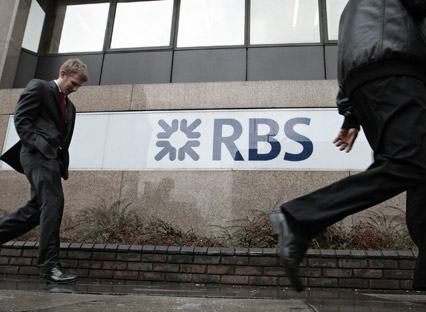Labour calls on Osborne to limit RBS bonuses
Government pressed to use its 81% stake in RBS to block bonuses of up to twice the size of salaries

A free daily email with the biggest news stories of the day – and the best features from TheWeek.com
You are now subscribed
Your newsletter sign-up was successful
LABOUR has called on George Osborne to clamp down on bonuses for bankers at the Royal Bank of Scotland.
The Government is under pressure to use its 81 per cent stake in RBS to prevent the bailed-out bank from paying out bonuses of up to twice the size of its bankers' salaries.
Under a new EU law, bonuses for top bank staff cannot exceed the size of their salaries, unless they ask for shareholders' approval. Labour has tabled a Commons motion calling on the Government – RBS's biggest shareholder – to reject any such request.
The Week
Escape your echo chamber. Get the facts behind the news, plus analysis from multiple perspectives.

Sign up for The Week's Free Newsletters
From our morning news briefing to a weekly Good News Newsletter, get the best of The Week delivered directly to your inbox.
From our morning news briefing to a weekly Good News Newsletter, get the best of The Week delivered directly to your inbox.
They will argue that the taxpayer-owned bank should not be permitted to pay out such huge bonuses at a time when ordinary families are facing a "cost-of-living crisis".
The Times describes Labour's demands as "a major escalation of the party's hostilities towards the banking sector".
RBS has significantly shrunk its investment banking division and will pay out a smaller bonus pot than many of its rivals, says the Financial Times. "Nevertheless Ross McEwan, its new chief executive, is heading for a particularly thorny showdown over bonuses, given that RBS is still heavily loss-making and has been accused of treating small businesses poorly," says the newspaper.
RBS said yesterday that "no decisions have been made" about bonuses.
A free daily email with the biggest news stories of the day – and the best features from TheWeek.com
Meanwhile, the Treasury has already launched a separate legal challenge arguing against the EU's right to set any limits on banking bonuses at all. Osborne believes that such intervention could lead to an increase in base pay and undermine financial stability.
Labour leader Ed Miliband is also expected to propose a cap on the size of UK banks in a bid to increase competition in the domestic market. Miliband looks likely to try to bring in a market-share cap – limited to around 20 to 25 per cent – if a Labour government was elected.
-
 What is the endgame in the DHS shutdown?
What is the endgame in the DHS shutdown?Today’s Big Question Democrats want to rein in ICE’s immigration crackdown
-
 ‘Poor time management isn’t just an inconvenience’
‘Poor time management isn’t just an inconvenience’Instant Opinion Opinion, comment and editorials of the day
-
 Bad Bunny’s Super Bowl: A win for unity
Bad Bunny’s Super Bowl: A win for unityFeature The global superstar's halftime show was a celebration for everyone to enjoy
-
 How corrupt is the UK?
How corrupt is the UK?The Explainer Decline in standards ‘risks becoming a defining feature of our political culture’ as Britain falls to lowest ever score on global index
-
 Reforming the House of Lords
Reforming the House of LordsThe Explainer Keir Starmer’s government regards reform of the House of Lords as ‘long overdue and essential’
-
 How long can Keir Starmer last as Labour leader?
How long can Keir Starmer last as Labour leader?Today's Big Question Pathway to a coup ‘still unclear’ even as potential challengers begin manoeuvring into position
-
 The high street: Britain’s next political battleground?
The high street: Britain’s next political battleground?In the Spotlight Mass closure of shops and influx of organised crime are fuelling voter anger, and offer an opening for Reform UK
-
 Is a Reform-Tory pact becoming more likely?
Is a Reform-Tory pact becoming more likely?Today’s Big Question Nigel Farage’s party is ahead in the polls but still falls well short of a Commons majority, while Conservatives are still losing MPs to Reform
-
 The launch of Your Party: how it could work
The launch of Your Party: how it could workThe Explainer Despite landmark decisions made over the party’s makeup at their first conference, core frustrations are ‘likely to only intensify in the near-future’
-
 What does the fall in net migration mean for the UK?
What does the fall in net migration mean for the UK?Today’s Big Question With Labour and the Tories trying to ‘claim credit’ for lower figures, the ‘underlying picture is far less clear-cut’
-
 Will the public buy Rachel Reeves’s tax rises?
Will the public buy Rachel Reeves’s tax rises?Today’s Big Question The Chancellor refused to rule out tax increases in her televised address, and is set to reverse pledges made in the election manifesto